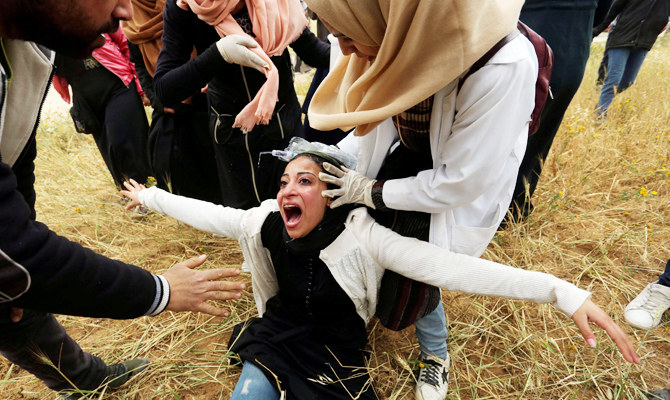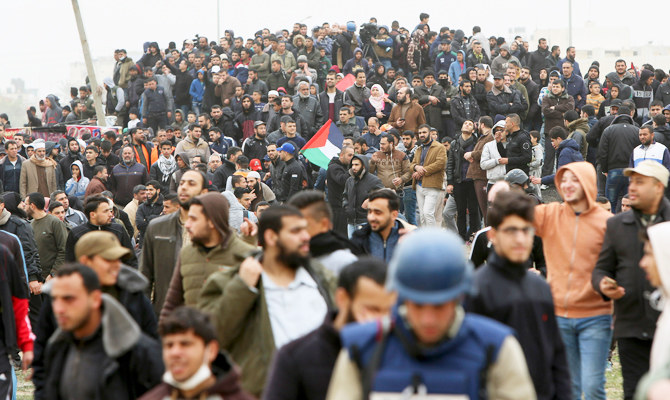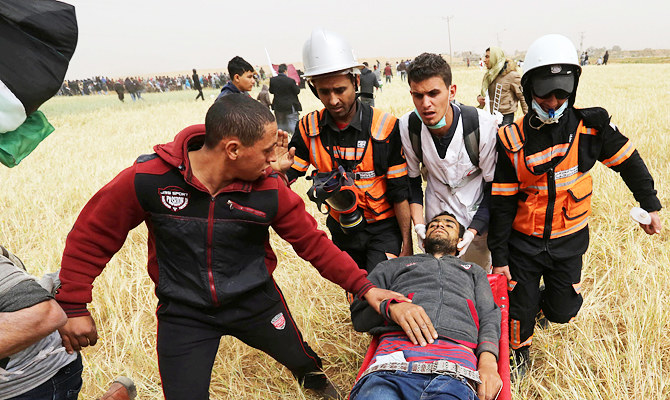GAZA CITY, Gaza Strip: Militants fired five rockets from Gaza into Israel early Sunday, the Israeli military said, following a day of Palestinian mass protests along the Israel-Gaza perimeter fence. Four Palestinians, including three teen-agers, were shot dead and dozens were wounded by Israeli soldiers.
The rocket fire threatened to undermine Egyptian-mediated efforts to cement a deal that the Gaza Strip’s Hamas rulers hope will ease a crippling Israeli-Egyptian blockade of the crowded territory.
No casualties were reported from the rockets and no Palestinian group claimed responsibility.
Tens of thousands of Palestinians rallied in the Gaza Strip on Saturday to mark the anniversary of their mass protests along the Israeli border.
Most demonstrators kept their distance from the border, though small crowds of activists approached the perimeter fence and threw stones and explosives toward Israeli troops on the other side. The forces fired tear gas and opened fire, killing four Palestinians and wounding 64.
Hamas had pledged to keep the crowds a safe distance from the fence to avoid inflaming the political atmosphere during negotiations of a possible easing of the blockade.
Hamas officials say that Israel is offering a package of economic incentives in exchange for calm along the volatile border.
Khalil Al-Hayya, a senior Hamas official, said the group had received “positive signs” from the Egyptians. He added that the Egyptian team was to return to Israel on Sunday to continue the talks. “We will continue our marches until all our goals are achieved,” he said.
Saturday’s protest came at a sensitive time, with Israel and Hamas, bitter enemies that have fought three wars and dozens of smaller skirmishes, both having a strong interest in keeping things quiet.
Israeli Prime Minister Benjamin Netanyahu is seeking his fourth consecutive term in April 9 elections, but is facing a serious challenge from a group of ex-army chiefs who have criticized what they say is his failed Gaza policy. With a lack of alternatives, Netanyahu has been forced at times to rely on Hamas to maintain stability along Israel’s volatile southern front.
In the final stretch of the campaign, Netanyahu needs to keep the Israel-Gaza frontier quiet, without seeming to make concessions to Hamas. Netanyahu took heavy criticism this week for what was seen as a soft response to renewed rocket fire out of Gaza.
Hamas, meanwhile, faces growing unrest in Gaza as a result of worsening conditions after more than a decade of an Israeli-Egyptian blockade. The two countries imposed the blockade in 2007 after Hamas, an Islamic militant group that seeks Israel’s destruction, seized control of Gaza from the internationally recognized Palestinian Authority.
The blockade has helped drive unemployment over 50 percent, led to chronic power outages and made it extremely difficult for Gazans to travel out of the territory.
Earlier this month, Hamas violently suppressed several days of public protests, staged under the slogan “We want to live,” over the dire conditions.
Speaking on the group’s Al-Aqsa TV station, Hamas’ top leader in Gaza, Yehya Sinwar, praised the protesters. “With this big turnout, our people say, ‘We want to live!“
His use of the protesters’ slogan appeared to be aimed at diverting the recent criticism of his group. Hamas blames the blockade and punitive measures by its West Bank-based Palestinian Authority for worsening the living conditions.
The fence protests, which began exactly a year ago, have been aimed in large part at breaking the Israeli-Egyptian blockade on Gaza, but haven’t delivered major improvements.
Saturday’s demonstrations were held at five rallying points along the border with Israel. Dozens of volunteers in fluorescent vests were deployed to restrain demonstrators, and cool rainy weather also appeared to affect enthusiasm.
But as the crowds swelled throughout the afternoon in response to Hamas’ calls for a large turnout, dozens of protesters approached the fence, unfurling Palestinian flags and throwing rocks and explosives toward Israeli soldiers. The Israeli forces responded with tear gas and live fire.
The Israeli military estimated 40,000 Palestinians were gathered at the marches.
“The rioters are hurling rocks and setting tires on fire. In addition, a number of grenades and explosive devices have been hurled at the Gaza Strip security fence,” it said in a statement.
In a statement, Prime Minister Netanyahu praised the army’s preparation and performance in maintaining “calm.”
Gaza’s Health Ministry said that a 17-year-old protester died immediately after being shot in the face in east Gaza City. In the evening, the ministry said another 17-year-old died hours after being shot in the chest in a different protest location.
A third teenager, also aged 17, succumbed to his wounds and died in the late evening. A 21-year-old Palestinian also died around dawn after sustaining injuries in overnight protests before the main demonstration.
While bloodshed was not avoided, it was far less than previous high-profile protests. Over 60 people were killed during intense protests on May 14, the day the US moved its embassy to Jerusalem.
As Saturday’s protest was winding down, organizers vowed to continue the marches and said they would gather again as usual next Friday.
The military released video footage showing large crowds of protesters gathered near the fence and hurling objects.
In one scene, a group of activists went up to the fence and hurled stones at the other side. In another scene, a youth could be seen trying to pull apart barbed wire along the fence.
The army also said it caught two young Palestinian children who had tried to cross the border with a knife. The children were returned to Gaza through a border crossing.
Earlier on Saturday, Gaza health officials said Israeli troops shot and killed a 21-year-old Palestinian man near the perimeter fence, hours before the mass rally.
The army said about 200 Palestinians “rioted during the night along the fence” and that the army used riot dispersal means against them.
The marches near were initially organized by grassroots activists who were calling for a mass return to ancestral homes in what is now Israel.
Hamas quickly took the lead in the protests, using the gatherings to call for an easing of the blockade.
The border marches routinely ended in confrontations, with some of the Palestinian demonstrators burning tires, hurling fire bombs or setting off explosives and Israeli troops firing live rounds and tear gas.
According to a Gaza rights group and a count by The Associated Press, 196 Palestinians were killed in the demonstrations over the past year, including 41 minors, and thousands were wounded by live fire. An Israeli soldier was also killed in the context of the marches.
Israel says the army has been defending the border. The army accuses Hamas of using the large crowds as cover and encouraging demonstrators to hurl explosives, incendiary balloons and grenades across the border. But Israel has come under heavy international criticism for the large number of unarmed people who have been harmed.
Egypt has repeatedly tried to broker a cease-fire between Israel and Hamas, stepping up efforts in recent days after a Gaza rocket struck a house in central Israel earlier this week, injuring seven Israelis and threatening renewed escalation.
Rockets from Gaza Strip hit Israel; 4 die at border protest
Rockets from Gaza Strip hit Israel; 4 die at border protest

- Palestinian officials said a 21-year-old was shot early Saturday at a protest camp near the fence
- The demonstrations mark the anniversary of anti-Israeli protests
Elaborate military tunnel complex linked to Assad’s palace

- On the slopes of Mount Qasyun, secret tunnels links a military complex to the presidential palace
- During Assad’s rule, Qasyun was off limits to the people of Damascus
DAMASCUS: On the slopes of Mount Qasyun which overlooks Damascus, a network of tunnels links a military complex, tasked with defending the Syrian capital, to the presidential palace facing it.
The tunnels, seen by an AFP correspondent, are among secrets of president Bashar Assad’s rule exposed since rebels toppled him on December 8.
“We entered this enormous barracks of the Republican Guard after the liberation” of Damascus sent Assad fleeing to Moscow, said Mohammad Abu Salim, a military official from Hayat Tahrir Al-Sham (HTS), the dominant Islamist group in the alliance that overthrew Assad.
“We found a vast network of tunnels which lead to the presidential palace” on a neighboring hill, Salim said.
During Assad’s rule, Qasyun was off limits to the people of Damascus because it was an ideal location for snipers — the great view includes the presidential palaces and other government buildings.
It was also from this mountain that artillery units for years pounded rebel-held areas at the gates of the capital.
An AFP correspondent entered the Guard complex of two bunkers containing vast rooms reserved for its soldiers. The bunkers were equipped with telecommunications gear, electricity, a ventilation system and weapons supplies.
Other simpler tunnels were dug out of the rock to hold ammunition.
Despite such elaborate facilities, Syria’s army collapsed, with troops abandoning tanks and other gear as rebels advanced from their northern stronghold to the capital in less than two weeks,.
On the grounds of the Guard complex a statue of the president’s brother Bassel Assad, atop a horse, has been toppled and Bassel’s head severed.
Bassel Assad died in a 1994 road accident. He had been the presumed successor to his father Hafez Assad who set up the paranoid, secretive, repressive system of government that Bashar inherited when his father died in 2000.
In the immense Guard camp now, former rebel fighters use pictures of Bashar Assad and his father for target practice.
Tanks and heavy weapons still sit under arched stone shelters.
Resembling a macabre outdoor art installation, large empty rusted barrels with attached fins pointing skyward are lined up on the ground, their explosives further away.
“The regime used these barrels to bomb civilians in the north of Syria,” Abu Salim said.
The United Nations denounced Bashar’s use of such weapons dropped from helicopters or airplanes against civilian areas held by Assad’s opponents during Syria’s years-long civil war that began in 2011.
UNIFIL accuses Israeli army of deliberately destroying property in southern Lebanon

- Alleged that Israeli army bulldozer destroyed blue barrel marking withdrawal line between Lebanon and Israel
LONDON: The United Nations Interim Force in Lebanon (UNIFIL) on Saturday accused the Israeli army of deliberately destroying its property and critical infrastructure in southern Lebanon, marking a serious escalation in tensions along the border.
In a statement issued on Saturday, UNIFIL said: “This morning, peacekeepers witnessed an Israeli army bulldozer destroying a blue barrel marking the withdrawal line between Lebanon and Israel in Al-Labbouneh, as well as a watchtower belonging to the Lebanese Armed Forces adjacent to a UNIFIL site in the area.”
The blue barrels, which serve as markers for the withdrawal line — commonly referred to as the Blue Line — are crucial in delineating the boundary established following Israel’s withdrawal from southern Lebanon in 2000.
UNIFIL condemned the actions, describing them as a “deliberate and direct destruction” of its property and infrastructure clearly identifiable as belonging to the Lebanese Armed Forces (LAF). The statement further characterized the incident as “a blatant violation of (UN Security Council) Resolution 1701 and international law.”
Resolution 1701, adopted in 2006 to end hostilities between Israel and Hezbollah during the Second Lebanon War, calls for respect for Lebanon’s territorial integrity and the cessation of all aggressive actions in the area.
UNIFIL also urged all parties to exercise restraint and avoid any actions that could jeopardize the fragile cessation of hostilities.
“We urge all parties to refrain from any actions, including the destruction of property and civilian infrastructure, that could jeopardize the cessation of hostilities,” the statement added.
The incident comes amid heightened tensions along the Lebanon-Israel border, with several exchanges of fire reported in recent weeks.
Under the terms of the ceasefire, the Lebanese army is to deploy alongside UN peacekeepers in the south as the Israeli army withdraws over a 60-day period.
Hezbollah is to withdraw its forces north of the Litani River — some 30 kilometers (20 miles) from the border — and dismantle any remaining military infrastructure in the south.
In late December, the UN peacekeeping force expressed concern at the “continuing” damage being done by the Israeli military in south Lebanon.
Detailing its latest air strikes in Lebanon on Thursday, the Israeli military said it was acting to remove any threat to Israel “in accordance with the ceasefire understandings.”
How the collapse of law and order in Gaza has impeded the humanitarian response

- Looting of convoys and killing of aid workers make Gaza “the most dangerous” place for relief operations, says UN humanitarian chief
- Amid claims it is weaponizing starvation, analysts question Israel’s plan to hire private contractors to distribute aid after UNRWA ban
LONDON: Lawlessness has become a grim feature of daily life in the Gaza Strip, where gangs now routinely attack aid convoys bringing much-needed assistance into the embattled territory, crippling the international relief effort.
Already struggling under the pressure of Israeli restrictions on aid entering the enclave, the theft of these deliveries has compounded the humanitarian crisis, leaving scores of civilians to die from cold, dehydration, and malnutrition.
Those convoys that avoid the gangs then run the gauntlet of air attacks as Israel pounds northern Gaza in its ongoing offensive against the Palestinian militant group Hamas.
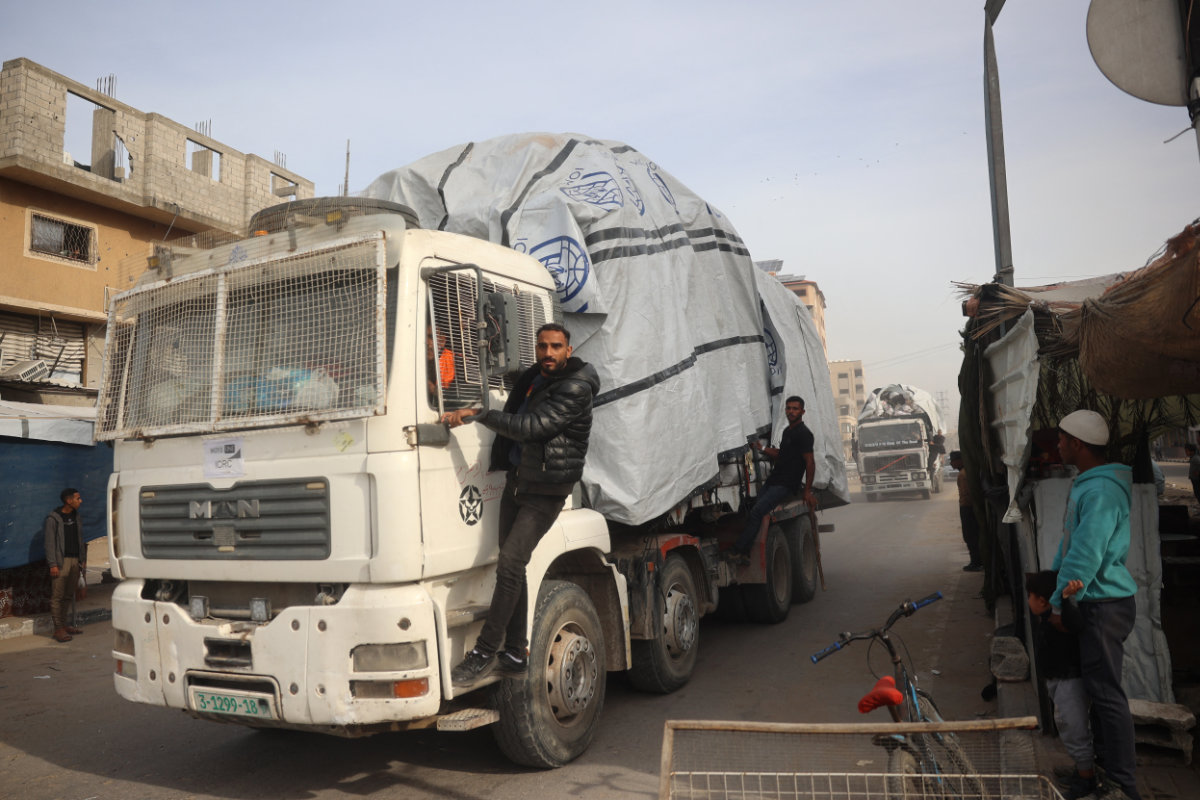
Tom Fletcher, the UN undersecretary-general for humanitarian affairs and emergency relief coordinator, has sounded the alarm about the worsening humanitarian situation, describing the context for aid delivery as among “the most dangerous” in the world.
“We deal with tough places to deliver humanitarian support,” he said in a statement on Dec. 23. “But Gaza is currently the most dangerous, in a year when more humanitarians have been killed than any on record.”
As of late November, at least 333 humanitarian aid workers had been killed in Gaza since the Oct. 7, 2023, Hamas-led attack on southern Israel sparked the conflict, according to UN figures.

Most of the casualties are staff of the UN Relief and Works Agency for Palestine Refugees in the Near East and the International Red Cross and Red Crescent Movement.
UN and US officials have accused Israel of failing to prevent gangs from looting aid convoys in Gaza, despite an October pledge to act quickly to improve the dire humanitarian situation in the enclave.
Israel denies deliberately restricting aid to Gaza or ignoring the proliferation of gangs and organized crime. It also accuses Hamas of diverting aid.
Cold winter conditions have made matters even worse for Gaza’s children. On Dec. 26, at least three infants died from hypothermia in Al-Mawasi refugee camp as temperatures dropped, the Palestinian news agency WAFA reported.

Exacerbating the situation, the Israeli government voted in October to ban UNRWA — the sole provider of aid to more than 2 million people in Gaza — starting from January. The ban follows Israeli claims that nine UNRWA staff were involved in the Oct. 7, 2023, attack.
Robert Blecher, director of the Future of Conflict program at International Crisis Group, believes Israel is “within its rights to block UNRWA on, say, national security grounds, so long as that exclusion in and of itself does not deprive civilians of aid.”
He told Arab News that although international humanitarian law “requires the rapid and unimpeded passage of humanitarian aid to those in need,” it “does not specify who must be permitted to deliver the aid.”
Two Israeli officials told The Times of Israel newspaper that the government has considered hiring private contractors to secure and deliver relief in Gaza, preventing diversion by Hamas and other armed groups.
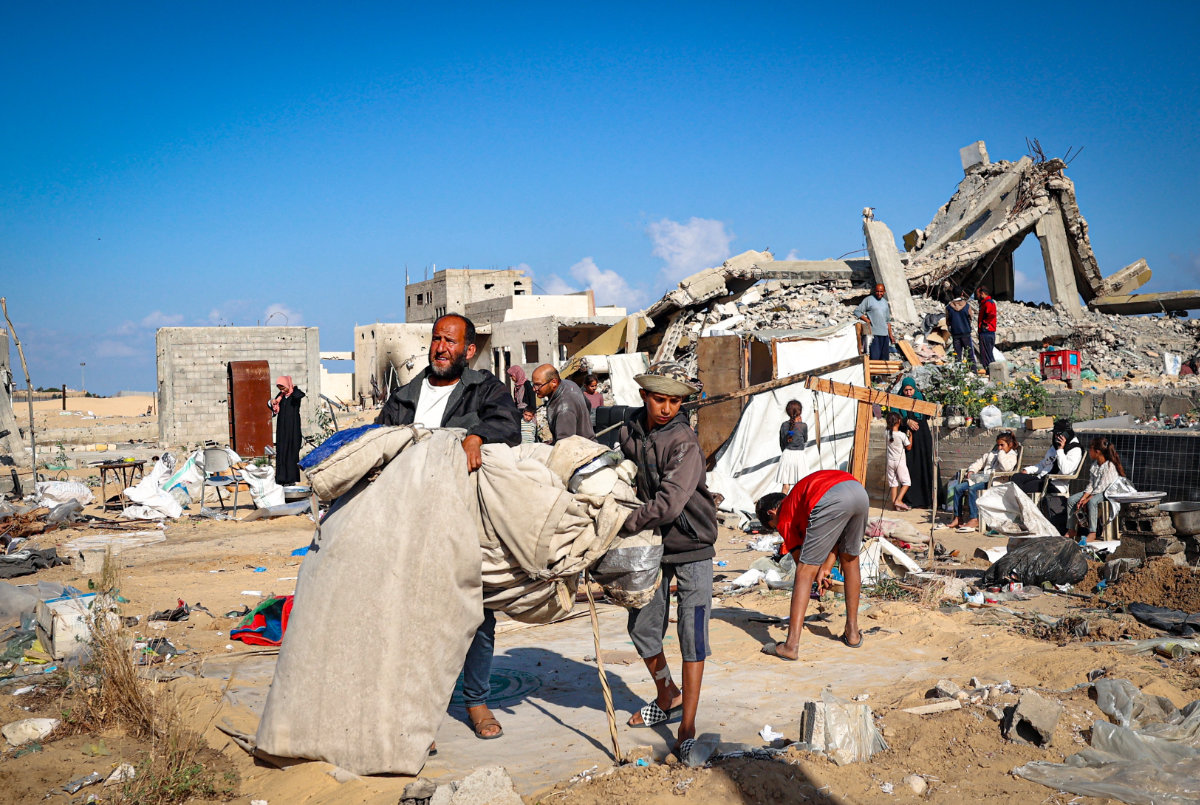
Blecher described the issue of private security contractors distributing food as a question of “feasibility,” saying:
“Theoretically speaking, if the private security contractors were to be brought in as part of a political agreement between Israel and the Palestinians to solve a technical problem, then yes, their involvement could be feasible.
“There would still be challenges of accountability and capacity, as well as a broader chipping away at the global humanitarian system, but in theory, it could work.”
Nevertheless, there are doubts about whether a state, whose prime minister and former minister of defense have been accused by the International Criminal Court of weaponizing starvation, would follow through with such a plan.
“If private security contractors are brought in without a political agreement as a replacement for Israeli soldiers, they will be seen as occupiers and treated as such,” said Blecher. “That’s the more likely scenario.”
Under international humanitarian law, Israel, classified as an occupying power in Gaza, is obligated to “take all the measures in its power to restore, and ensure, as far as possible, public order and safety.”
In addition, Article 55 of the Fourth Geneva Convention requires Israel to ensure the provision of food and medical supplies to the population, while Article 56 mandates the maintenance of medical and hospital services, as well as public health and hygiene, in the occupied territory.
“It seems pretty clear to everyone that Israel is the occupying power and therefore is responsible for the well-being of the civilian population,” Khaled Elgindy, a senior fellow at the Middle East Institute, told Arab News.
“Obviously, almost everything that Israel is doing is contrary to that.”
He added: “It has heavily restricted food and humanitarian aid as a matter of policy. That was clear from day one in the pronouncements of Israeli leaders. And it’s been clear ever since.
“Now, many different groups have concluded — including Oxfam, humanitarian organizations, human rights groups, and even agencies within the US government — that Israel is using starvation as a weapon of war.”
Tightening the noose on Gaza’s war-stricken population are the rising attacks on aid convoys. In October, $9.5 million worth of food and other goods were looted, representing nearly a quarter of all the humanitarian aid sent to Gaza that month, according to UN figures.
Preliminary data indicates that looting in November was significantly worse.
In one of the single worst incidents, in mid-November, a 109-truck convoy chartered by UN agencies was attacked shortly after it was permitted to pass through a southern Gaza border crossing at night, several hours earlier than previously scheduled, according to Reuters.
Although they were stationed nearby, Israeli troops reportedly did not intervene as gunmen from multiple gangs surrounded the convoy, forced the drivers out, and stole flour and other food items.
Despite the deconfliction process, in which humanitarian groups share their coordinates and agree with Israeli authorities on when and how aid is delivered, relief convoys “are still being targeted,” making it “very difficult to deliver anything,” said Elgindy.
“That’s why in many instances, we’ve seen groups like UNRWA, World Central Kitchen, and others have to suspend their aid operations in certain moments and certain places because they can’t guarantee the safety of those delivering the aid.”
Israeli forces have also been implicated in attacks on aid convoys, although they have denied deliberately targeting them. In one such attack in April, Israeli drone operators fired on three World Central Kitchen vehicles, killing seven aid workers and forcing the nongovernmental organization to pause operations in Gaza.
In an effort to restore order after Israel began targeting police officers in early 2024, citing their role in Hamas governance, Hamas told the BBC in November it was working on a plan to restore security to 60 percent of Gaza within a month, up from less than 20 percent.
And while some Gazans in the south welcomed the effort, others saw it as an attempt to take control of lucrative black markets.
Indeed, some Palestinians on social media have reported having to buy items that were originally intended for aid distribution.
Israel “has not allowed Hamas — the governing authority in Gaza — to regroup even as a civilian force, as a police force,” said Elgindy.
In the absence of law and order, he said Gaza has descended into a situation governed by “the law of the jungle.
“Whoever has guns — gangs and armed groups — will commandeer aid,” he said. “There have also been cases where Israeli authorities are within eyesight of the looting and they do not intervene.”
Israel is therefore “not meeting any of its obligations” under international humanitarian law, “not even in the most minimal sense of providing for the welfare of the civilian population.”

Lebanon PM, Syrian leader in talks to restore calm at border

- Israel hints at further incursions into southern Lebanon, demolishes more villages
BEIRUT: Syria’s new leader Ahmed Al-Sharaa has invited Lebanon’s caretaker Prime Minister Najib Mikati to visit his country to boost bilateral ties.
In a phone call on Friday with Al-Sharaa, Mikati discussed relations between the two countries, according to a statement from the prime minister’s office.
Al-Sharaa also said that Syrian authorities had taken “necessary measures” to restore calm on the border between the two countries, according to the statement.
The call between Mikati and Al-Sharaa addressed an attack on the Lebanese army by Syrian gunmen on Friday.
Calm was restored on Saturday as political negotiations intensified to prevent any escalation.
The gunmen, from the Syrian region of Sarghaya, attacked the Lebanese soldiers to try and prevent them closing an illegal border crossing in Maarboun–Baalbek. Four soldiers were injured in the clashes.
The Lebanese Army Command said the troops “repelled Syrian gunmen after they targeted a military unit with medium weapons, causing moderate injuries to four soldiers.”
The Presidency of the Council of Ministers said on Saturday that Al-Sharaa “confirmed that the concerned Syrian agencies took all necessary measures to restore calm to the border and prevent the recurrence of such incidents.”
A fragile ceasefire between Israel and Hezbollah has held for over a month, even though its terms seem unlikely to be met by the agreed-upon deadline.
Under the ceasefire agreement, which came into effect on Nov. 27, the Israeli forces that penetrated the border area to depths ranging from three to 9 km have 21 days left to withdraw completely. But Israeli forces continue to violate the agreement extensively, both by air and by land, infiltrating towns they had not entered during the ground war launched on Oct. 1.
On Saturday morning, the Israeli army carried out excavation and leveling operations near cemeteries in Markaba town.
Security reports from the area said that “Israeli army patrols moved from Odaisseh toward Taybeh, conducting intensive sweeps with machine guns, while war drones flew at low altitudes in the western sector, particularly over the Tyre district.”
For the first time since the ceasefire, drones violated airspace over the towns of Doueir, Jibchit, Harouf, Ebba, Zebdine, and Choukine in the Nabatieh district. Residents reported “dozens of drones flying overhead at low altitudes.”
Israeli forces also conducted a sweep from the Maroun Al-Ras area toward the city of Bint Jbeil, using machine guns. The force included five tanks and a bulldozer and targeted a house with a shell fired from a Merkava tank before moving on to the building.
The garrisons of two Israeli army positions in Al-Ramtha and Al-Samaqa carried out wide-ranging sweeps with heavy machine guns targeting the surrounding valleys.
Israeli forces also carried out a demolition operation between the towns of Taybeh and Rab Al-Thalathin in the Marjayoun district.
Images captured by activists and shared on social media from the border area, particularly in Mays Al-Jabal, reveal unprecedented destruction of the town, affecting residential and commercial buildings, as well as places of worship.
The Israeli military also targeted the Imam Sadr Sports Complex west of Mays Al-Jabal with artillery on Saturday.
Israeli media reported that the current Israeli approach “aims to effectively restrict Hezbollah’s capabilities, preventing the group from conducting large-scale operations or controlling strategic areas in Lebanon.”
Strategic and military affairs researcher Ali Abbas Hamieh told Arab News that “Israeli forces, during their incursion into the border area over the past 38 days, have succeeded in targeting Hezbollah’s infrastructure; however, these were general structures and did not include the strategic weapons possessed by the group.”
Hamieh said Israeli operations had sometimes destroyed the entrances to Hezbollah’s tunnels, but they had not eliminated what was inside them. “Consequently, the Israelis are attempting to extend the ceasefire period further.”
Hamieh said that Hezbollah “is currently reorganizing its military position despite the other siege being imposed on Hezbollah on the economic level, aimed at undermining it militarily.”
Hamieh expressed his concern that “extending the deadline for the presence of Israeli forces in the border area for an additional three months, as rumored, could serve as a pretext for the resumption of hostilities.”
The analyst said: “It is important to note that the formula used to persuade both parties to cease fire was that if the war continued, it would be a loss for both sides, whereas if it stopped, it would be a victory for both.”
Also on Saturday, the Israeli Broadcasting Corporation said the government would “inform Washington that it will not withdraw from Lebanon after the current deadline expires and will convey a message to the US that it will not allow residents of Lebanese villages near the border to return to their homes.”
But Israeli media reported later that “no decision has been made yet regarding extending the Israeli army’s presence in southern Lebanon.”
Hamas armed wing releases video of Gaza hostage

- The Hostages and Missing Families Forum said Albag’s family has not authorized publication of video
JERUSALEM: The armed wing of Hamas, the Ezzedine Al-Qassam Brigades, released a video on Saturday of an Israeli hostage held in Gaza since its October 2023 attack.
In the undated, three-and-a-half-minute video recording that AFP has not been able to verify, 19-year-old soldier Liri Albag called in Hebrew for the Israeli government to secure her release.
The Hostages and Missing Families Forum, a campaign group for relatives of those abducted, said Albag’s family has not authorized publication of the video.
“We appeal to the prime minister, world leaders and all decision-makers: it’s time to take decisions as if it were your own children there,” the family said in a statement.
Albag was 18 when she was captured by Palestinian militants at the Nahal Oz base on the Gaza border along with six other women conscripts, five of whom remain in captivity.
Hamas and its ally Islamic Jihad have released a number of videos of Israeli hostages in their custody during nearly 15 months of fighting in Gaza.
The militants seized 251 hostages during the 2023 attack, of whom 96 remain in Gaza. The Israeli military says 34 of those are dead.
Hamas said late on Friday that indirect negotiations with Israel for a truce and hostage release deal were to resume in Qatar that same night. There has since been no update.
Mediators Qatar, Egypt and the US have been engaged in months of effort that have failed to end the war.
Weekly demonstrations organized by the hostages forum, the latest scheduled in Tel Aviv on Saturday, have kept up the pressure on Prime Minister Benjamin Netanyahu for a deal to free the hostages.
The prime minister’s critics in Israel have accused him of stalling on a deal.
The forum said the latest video was “firm and incontestable proof of the urgency of bringing the hostages home.”
On Thursday, Netanyahu’s office said he had authorized Israeli negotiators to join the latest round of truce and hostage release talks in Qatar.


